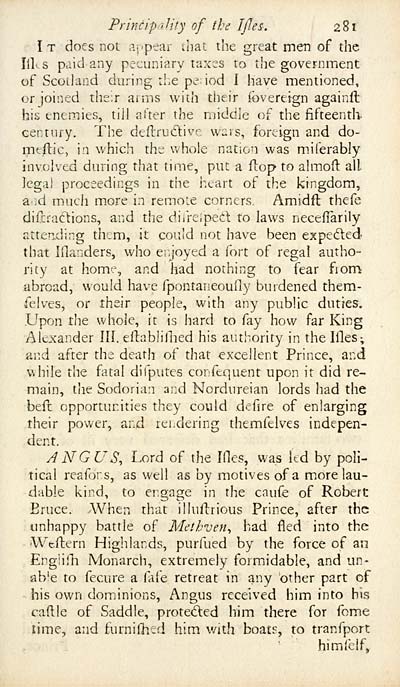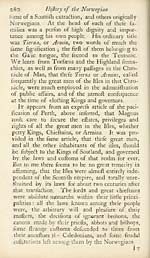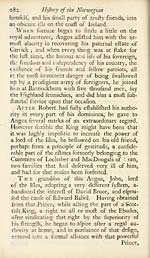Blair Collection > Critical dissertations on the origin, antiquities, language, government, manners, and religion, of the antient Caledonians, their posterity the Picts, and the British and Irish Scots
(319)
Download files
Complete book:
Individual page:
Thumbnail gallery: Grid view | List view

Princip'Hty of the Ifles. 281
I T does not appear that the great men of the
Ill^-s paid any pecuniary taxes to the government
of Scotland during the pe:iod I have mentioned,
or joined their arms with their fovereign againfl
his enemies, till ai'ter the middle of the fifteentli
centiify. The deflrudive wars, foreign and do-
mtftic, in which the whole nation was miferably
involved during that time, put a fbop to alm.ofl: all
legal proceedings in ttie heart of the kingdom,
aid much m.ore in remote corners. Amidfl thefe
dilerac^lions, and the diiVeiped to laws necefiarily
atten-ding them, it could not have been expeded
that Iilanders, who enjoyed a fort of regal autho-
rity at home, and had nothing to fear fiom
abroad, would have fpontaneoufly burdened them-
felves, or their people, with any public duties.
.Upon the whole, it is hard to fay how far King
Alexander III. eftablifned his authority in the Illes;
ar.d after the death of that excellent Prince, and
while the fatal difputes conftquent upon it did re-
main, the Sodorian and Nordureian lords had the
beft opportunities they could defire of enlarging
their power, and rendering themfelves indepen-
dent.
ANGUS, Lord of the Ifies, was ltd by poli-
tical reafors, as well as by motives of a m.ore lau-
dable kind, to engage in the caufe of Robert
Efuce. When that illuftrious Prince, after the
unhappy battle of Methven, had fled into the
'Wcftern Highlands, purfued by the force of an
Englifn Monarch, extremely formidable, and un-
ab'e to fecure a fafe retreat in any other part of
his own dominions, Angus received him into his
caflle of Saddle, protected him there for fome
time, and furnhhed him with boats, to tranfport
him (elf,
I T does not appear that the great men of the
Ill^-s paid any pecuniary taxes to the government
of Scotland during the pe:iod I have mentioned,
or joined their arms with their fovereign againfl
his enemies, till ai'ter the middle of the fifteentli
centiify. The deflrudive wars, foreign and do-
mtftic, in which the whole nation was miferably
involved during that time, put a fbop to alm.ofl: all
legal proceedings in ttie heart of the kingdom,
aid much m.ore in remote corners. Amidfl thefe
dilerac^lions, and the diiVeiped to laws necefiarily
atten-ding them, it could not have been expeded
that Iilanders, who enjoyed a fort of regal autho-
rity at home, and had nothing to fear fiom
abroad, would have fpontaneoufly burdened them-
felves, or their people, with any public duties.
.Upon the whole, it is hard to fay how far King
Alexander III. eftablifned his authority in the Illes;
ar.d after the death of that excellent Prince, and
while the fatal difputes conftquent upon it did re-
main, the Sodorian and Nordureian lords had the
beft opportunities they could defire of enlarging
their power, and rendering themfelves indepen-
dent.
ANGUS, Lord of the Ifies, was ltd by poli-
tical reafors, as well as by motives of a m.ore lau-
dable kind, to engage in the caufe of Robert
Efuce. When that illuftrious Prince, after the
unhappy battle of Methven, had fled into the
'Wcftern Highlands, purfued by the force of an
Englifn Monarch, extremely formidable, and un-
ab'e to fecure a fafe retreat in any other part of
his own dominions, Angus received him into his
caflle of Saddle, protected him there for fome
time, and furnhhed him with boats, to tranfport
him (elf,
Set display mode to: Large image | Transcription
Images and transcriptions on this page, including medium image downloads, may be used under the Creative Commons Attribution 4.0 International Licence unless otherwise stated. ![]()
| Permanent URL | https://digital.nls.uk/76290120 |
|---|
| Description | A selection of books from a collection of more than 500 titles, mostly on religious and literary topics. Also includes some material dealing with other Celtic languages and societies. Collection created towards the end of the 19th century by Lady Evelyn Stewart Murray. |
|---|
| Description | Selected items from five 'Special and Named Printed Collections'. Includes books in Gaelic and other Celtic languages, works about the Gaels, their languages, literature, culture and history. |
|---|

